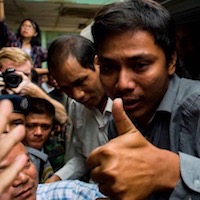News
Detained reporters' bail decision set for 1 February
Tuesday 23 January 2018

A decision on bail for two Reuters journalists held in Myanmar will be given on 1 February, their lawyer said after another court appearance by the pair.
The news raised fears Wa Lone, 31, and Kyaw Soe Oo, 27, could otherwise face months in detention during convoluted pre-trial hearings.
They are accused of receiving classified documents from two policemen over dinner nearly six weeks ago. They have been held in custody since their arrest on the British colonial-era charge, which carries a maximum sentence of up to 14 years in jail.
Pre-trial hearings are likely to take up to three or four months, Reuters lawyer Khin Maung Zaw said as the reporters faced their latest court hearing.
The lawyer’s request for bail was blocked by the prosecution and the court said it would decide on the matter on 1 February.
As the pair were led from the packed courtroom, a handcuffed Kyaw Soe Oo (photo) shouted to the assembled media “please try to get press freedom”.
The reporters were formally charged by police on January 10.
The charge is not a bailable offence, but the court has discretion to grant bail if detention is deemed to be unlawful.
Under Myanmar’s arcane court procedure the Yangon court will next consider whether to accept the charge and begin a trial.
Their lawyer said 25 witnesses have to be heard - staggered over weeks - before the court decides whether to pursue the case.
That could leave the reporters languishing in detention for several months.
They had been reporting on the military campaign in the northern state of Rakhine that has forced more than 680,000 Rohingya Muslims to flee over the border to Bangladesh since August.
The UN and US have condemned the violence as ethnic cleansing.
Reuters issued the following statement: "We await the court’s ruling on bail. Time is of the essence and we continue to call for Wa Lone and Kyaw Soe Oo’s prompt release. They are innocent of any wrongdoing and should be allowed to return to their jobs reporting on events in Myanmar." ■
- SOURCE
- AFP
- « Previous
- Next »
- 644 of 2177